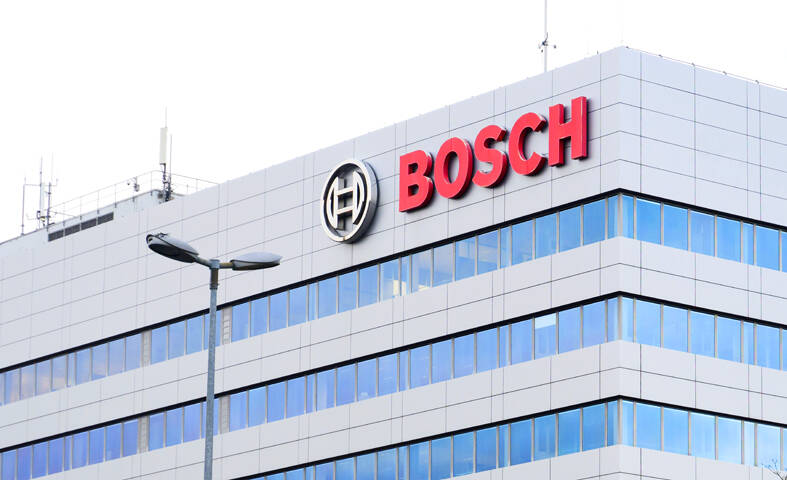Germany’s technology and services company Robert Bosch GmbH on Friday said that it planned to reduce its automotive division workforce by as many as 5,500 jobs in the next several years in another sign of the headwinds hitting the German and global auto industries.
The company cited stagnating global auto sales, too much factory capacity in the auto industry compared with sales prospects and a slower-than-expected transition to electric-powered, software-controlled vehicles.
The news comes two days after Ford Motor Co announced plans to cut 4,000 jobs in Europe, and with Volkswagen AG employees threatening work stoppages over what they say management has told them are plans to close as many as three factories in Germany. Meanwhile, revenue at Stellantis NV tumbled 27 percent in its most recent quarter that ended this fall.

Photo: Alicia Windzio / dpa via AP
Auto sales have slowed this year in Europe as consumers stung by inflation hold back on spending, while automakers have sunk billions into developing electric vehicles only to see slower sales than expected and new competition from cheaper Chinese brands. Moreover, the German government abruptly canceled purchase incentives at the end of last year, sending electric vehicle sales in that country down by 27 percent over the first nine months of this year.
About 3,500 of the job reductions at Bosch would come before the end of 2027 and would hit the part of the company that develops advanced driver assistance and automated driving technologies, as well as centralized vehicle software, the company said, adding that about half of those job reductions would be at locations in Germany.
“The auto industry has significant overcapacities,” the company said in a statement. “In addition, the market for future technologies is not developing as originally expected... At the moment, many projects in this business area are being put off or abandoned by automakers.”
In addition, 750 jobs would be lost at a plant in Hildesheim, Germany, by the end of 2032, 600 of those by the end of 2026. A plant in Schwaebisch Gmund would lose 1,300 jobs between 2027 and 2030.
The reductions are still in the planning stage and final numbers would have to be agreed with employee representatives and carried out in what the company said would be a socially responsible way.

With an approval rating of just two percent, Peruvian President Dina Boluarte might be the world’s most unpopular leader, according to pollsters. Protests greeted her rise to power 29 months ago, and have marked her entire term — joined by assorted scandals, investigations, controversies and a surge in gang violence. The 63-year-old is the target of a dozen probes, including for her alleged failure to declare gifts of luxury jewels and watches, a scandal inevitably dubbed “Rolexgate.” She is also under the microscope for a two-week undeclared absence for nose surgery — which she insists was medical, not cosmetic — and is

CAUTIOUS RECOVERY: While the manufacturing sector returned to growth amid the US-China trade truce, firms remain wary as uncertainty clouds the outlook, the CIER said The local manufacturing sector returned to expansion last month, as the official purchasing managers’ index (PMI) rose 2.1 points to 51.0, driven by a temporary easing in US-China trade tensions, the Chung-Hua Institution for Economic Research (CIER, 中華經濟研究院) said yesterday. The PMI gauges the health of the manufacturing industry, with readings above 50 indicating expansion and those below 50 signaling contraction. “Firms are not as pessimistic as they were in April, but they remain far from optimistic,” CIER president Lien Hsien-ming (連賢明) said at a news conference. The full impact of US tariff decisions is unlikely to become clear until later this month

GROWING CONCERN: Some senior Trump administration officials opposed the UAE expansion over fears that another TSMC project could jeopardize its US investment Taiwan Semiconductor Manufacturing Co (TSMC, 台積電) is evaluating building an advanced production facility in the United Arab Emirates (UAE) and has discussed the possibility with officials in US President Donald Trump’s administration, people familiar with the matter said, in a potentially major bet on the Middle East that would only come to fruition with Washington’s approval. The company has had multiple meetings in the past few months with US Special Envoy to the Middle East Steve Witkoff and officials from MGX, an influential investment vehicle overseen by the UAE president’s brother, the people said. The conversations are a continuation of talks that

CHIP DUTIES: TSMC said it voiced its concerns to Washington about tariffs, telling the US commerce department that it wants ‘fair treatment’ to protect its competitiveness Taiwan Semiconductor Manufacturing Co (TSMC, 台積電) yesterday reiterated robust business prospects for this year as strong artificial intelligence (AI) chip demand from Nvidia Corp and other customers would absorb the impacts of US tariffs. “The impact of tariffs would be indirect, as the custom tax is the importers’ responsibility, not the exporters,” TSMC chairman and chief executive officer C.C. Wei (魏哲家) said at the chipmaker’s annual shareholders’ meeting in Hsinchu City. TSMC’s business could be affected if people become reluctant to buy electronics due to inflated prices, Wei said. In addition, the chipmaker has voiced its concern to the US Department of Commerce